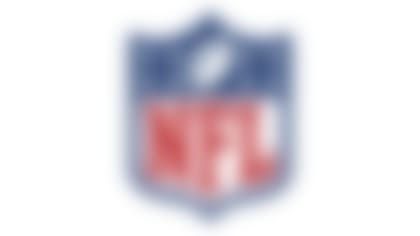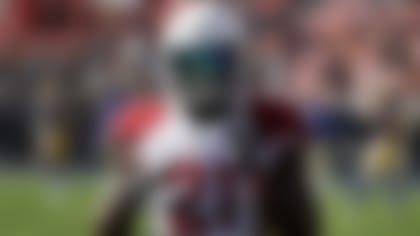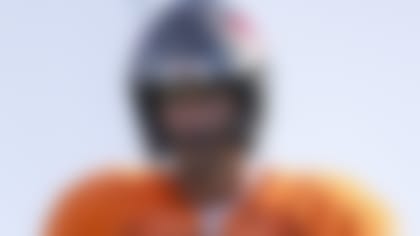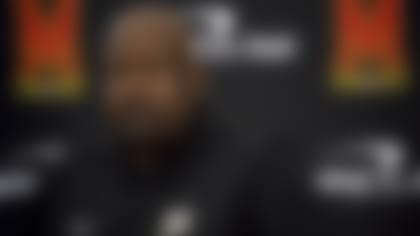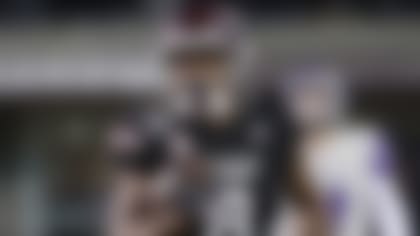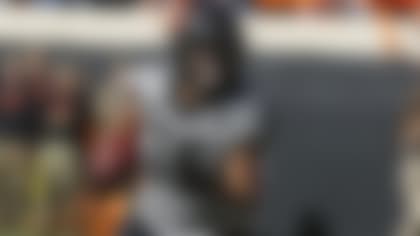The NFL's head of officiating said Monday that officials erred when they penalized Browns defensive end Myles Garrett for roughing the passer, leading to a Pittsburgh Steelers touchdown one play later in the second quarter of Sunday's 21-all tie that extended Cleveland's long winless streak.
But Al Riveron, the NFL's senior vice president of officiating, told me in a phone call that four other flags thrown for players landing on quarterbacks -- on Atlanta's Grady Jarrett, Cincinnati's Carlos Dunlap, Minnesota's Sheldon Richardson and New Orleans' David Onyemata -- were correctly called as penalties under a longstanding rule that prohibits a player from landing on the quarterback with most or all of his body weight, which is an area of emphasis for officials this year.
Entering Monday night's games, 14 roughing the passer penalties have been called in 14 Week 1 games -- twice as many as in all of Week 1 last year and more than double the average of 6.8 per full slate of games in 2017, according to NFL Research. Of those 14, 12 were correct, Riveron said, including four of five violations of the body-weight rule.
"The rule specifically says 'most, if not all, of your body weight,' " Riveron told me. "So we want that player to make an effort. And the last three or four weeks, we have pulled extensive video to show the clubs exactly what we're talking about, and we probably last week showed 5 to 1 or 6 to 1 of legal hits, or legal contact, as opposed to illegal contact. Because the question we get all the time is, well, what do you want our players to do?
"Well, they have to not put the weight on the quarterback. And this one (on Garrett) yesterday showed, even though there is some body weight on (Steelers quarterback) Ben (Roethlisberger), this is not what we would consider contact that rises to the level of a foul."
Five flags in Week 1 for putting body weight on the quarterback is particularly striking when considering only one was thrown for the new, much-discussed lowering-the-head penalty, on Kansas City Chiefs safety Ron Parker in Sunday's win over the Chargers.
The rule about landing on the quarterback has been on the books since 1995, with Rule 12, Section 2, Article 9 stating (emphasis mine): "When tackling a passer who is in a defenseless posture (e.g., during or just after throwing a pass), a defensive player must not unnecessarily or violently throw him down and land on top of him with all or most of the defender's weight." This year, the word "and" was changed to "or" -- a subtle tweak that effectively outlaws any instance in which a player lands hard on the quarterback.
The body-weight fouls correctly called in Week 1 all were against the rules in past years as well, Riveron noted, adding that "a good portion of clubs" indicated on an annual survey after last season that body weight on the quarterback was an area they wanted the officiating department and competition committee to look into. That came months after Packers star quarterback Aaron Rodgers' season ended on a controversial (but legal, at the time) hit by Minnesota Vikings linebacker Anthony Barr.
Browns coach Hue Jackson gave officials an earful and repeated his disagreement with the call against Garrett after the game, and Riveron agreed after reviewing the tape. At least two of the players penalized in other games expressed similar frustration to reporters after their games.
"I planked and rolled off right away and I tried to let the referee know I was not trying to be malicious and drive him through the ground, because I know it's (Colts quarterback) Andrew Luck after two years (dealing with injuries), so they're going to call it tight regardless," Dunlap said. "So, I tried to do the next best thing. There was no other way for me to try to avoid him on the front side, so on the back side, I tried to keep my weight from driving him into the ground, which is the terminology they used."
Asked what he did to draw a flag on his hit of 49ers quarterback Jimmy Garoppolo, Richardson said, according to the Pioneer Press: "Play football. That's it. It wasn't dirty. (I) took a step and hit him, perfect form tackle. What else you want me to do?"
Of the other seven roughing the passer penalties, the only incorrect call was on New Orleans' Marcus Davenport, who did not make contact with Tampa Bay's Ryan Fitzpatrick as the official believed, Riveron said. Riveron said he had not reviewed other unflagged plays to see if more flags should have been thrown.
As with most safety-related rule changes, such as protection for defenseless receivers years ago, the hope is an initial spate of flags gives way to adjustments in technique, fewer penalties and, ultimately, a safer game.
"It's a combination of several things: the coaching, obviously the players, and then the officiating," Riveron said. "But I think at the beginning, because it has not been called the way it has been called or the committee wants it to be called now differently or a certain way, then it levels off and everyone adjusts to it."
For defensive players, that may not always be easy.
"You've just got to be conscious of it when it happens," Barr told me last week. "It happens fast. You're trying to make a play on the ball. You're not trying to cause a penalty or hurt your team by any means, and sometimes it happens in the heat of the moment. So, I think we're going to see a lot of that (call) this year. But again, it's the rule, so what you going to do? Play by it."
Follow Tom Pelissero on Twitter @TomPelissero.

